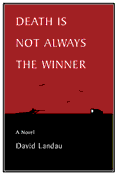

Remarks by David Landau on Death Is Not Always the Winner
Olssons Bookstore, Washington DC, June 26, 2003

In February 1957, a special correspondent of The New York Times filed a striking series of reports from Cuba that canonized Fidel Castro as the man who would save the country from a reign of corruption and evil (2/24-26/57). Those reports played an important part in bringing Castro to power. You might think the record of the last four decades would have led The Times to change its mind about Cuba’s maximum leader. But The Times celebrated the 40th anniversary of Castro’s coming to power with a pair of articles from Cuba whose headlines were written in New York and dreamt in Havana. “In City of Castro’s Triumph, Most Still Back Him.” “Castro Talk Shows Him Still a Rebel And Prophet” (1/2-3/99). For half a century, this kind of journalism has been dominating our viewpoints about Cuba and creating all kinds of mischievous impressions. Look at a recent headline in The Washington Post: “Things aren’t perfect in Castro’s Cuba, but the Communist dream has staying power” (1/11/99). Today, the ruined nation of Cuba remains a distant province of Yankee journalism.
Rodrigo, the hero of Death Is Not Always the Winner—unlike poster images of Castro, Ché Guevara and others—is complicated and human, all too human. He is not built to please; at a glance, he is more likely to puzzle and annoy people than to be understood by them. He is, however, quintessentially Cuban. Fidel Castro—even for those who don’t like him—represents, with his massive and consistent image, the heroic ideal. Rodrigo is smaller than Castro, noisier; he doesn’t have that smooth consistency. But in the end Rodrigo emerges the hero because he is faithful to other people even after those same people have stopped being faithful to themselves. He’s the real idealist—while Castro is an opportunist because his only measure of success is how much he can get from other people.
When Cuba reconstructs from a half-century of Castro, it is going to be Rodrigo’s kind of heroism, not Castro-style posturing, that will make an affirmative difference to the country. And for Americans, understanding Rodrigo will be essential not just in relating to the struggles of a foreign people but also in forming a deeper, more mature, more respectable sense of themselves.
____________
![]()
Death Is Not Always the Winner, by David Landau, a novel in English /
No siempre gana la muerte, translation by Benigno Dou Machín. Pureplay Press,
2003; softcover, 252/272 pages, ISBN’s: 0-9714366-0-6/0-9714366-1-4 ; $ 15.00 each issue
Copyright © 2012 Pureplay Press. All rights reserved.